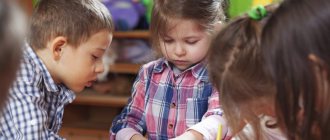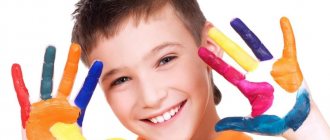The essence of social and personal development of a preschooler
Definition 1
Social and personal development is the formation of a child’s correct attitude towards himself and the environment, as well as his social motives and needs.
In accordance with the Federal State Educational Standard for Additional Education, social and personal development is included in the educational area “Social and communicative development” and is aimed at:
- children’s assimilation of values and norms accepted in modern society;
- formation and development of communication skills through active interaction of the child with peers and adults;
- formation of skills of independence, self-education, self-regulation and direction of one’s actions;
- development of emotional and social intelligence, empathy and emotional responsiveness (empathy);
- formation of readiness to carry out joint activities with peers;
- formation of respect for the surrounding people, the Motherland, history and traditions of the people;
- developing pride and a sense of belonging to one’s family, nationality and community;
- formation of a positive attitude towards various types of labor and creative activities;
- formation of the foundations for safe behavior in everyday life, society and nature.
Are you an expert in this subject area? We invite you to become the author of the Directory Working Conditions
Within the preschool educational institution, the social and personal development of preschool children is carried out in the following forms:
- educational activities;
- joint activities of the teacher and children;
- joint activities of pupils;
- individual types of work of a teacher with children.
Currently, modern kindergartens pay great attention to solving the problem of social and personal development of preschool children. This is due to the fact that it is aimed at shaping the child’s attitude towards the world around him and himself, contributes to the development of social needs and motives, and the formation of self-knowledge. Social and personal development requires a considerable amount of labor from the teacher and the manifestation of pedagogical professionalism, which contributes to obtaining a visible result.
Tasks of social and personal development of preschool children
The main tasks of social and personal development of preschool children:
- Formation in children of a complete picture of the social world, themselves and their place in society.
- Nurturing an active life position and adequate social feelings.
- Forming an idea about the people around you, yourself, nature, man-made works, etc.
Finished works on a similar topic
Course work Social and personal development of preschool children 420 ₽ Abstract Social and personal development of preschool children 230 ₽ Test work Social and personal development of preschool children 210 ₽
Receive completed work or specialist advice on your educational project Find out the cost
The process of social and personal development continues in a person throughout his life. However, its foundation is laid in preschool childhood. It is during this age period that the first components of social behavior are formed in the child, and emotional, personal and behavioral lines appear. Children are always active and strive to perform various types of activities; the task of the educator (parent) is not to slow them down in this endeavor, but, on the contrary, to motivate them for constant development and improvement, not to let the desire to develop and learn fade away. A large role in this direction is played by various types of games that the child plays not only with peers, but also with adults and even with himself.
It is a mistaken opinion that a child should constantly be doing something useful, and not just playing. However, it is the game that is the leading activity of the child. In play, a child learns about the world, develops, and develops the necessary skills and abilities. During games, children's development moves at a rapid pace: mental, social, emotional. Every teacher, organizing the social and personal development of preschool children, must make maximum use of the opportunities of play for the social development of children.
Article:
Currently, the main attention is paid to the problem of social and personal development and education of preschool children.
The process of social and personal development of a preschooler is very complex and requires a lot of work from the teacher. The concept of social and personal development of a preschooler includes the following components - this is first of all; the formation of the child’s attitude towards himself and the environment, secondly, his development of social motives and needs, and thirdly, the formation of his self-knowledge. The process of socialization begins in a person in childhood and continues throughout his life. We know well that the development of the necessary components of social behavior in children is hampered by an insufficient level of speech development, and naturally this contributes to the child’s problems in the emotional, personal and behavioral spheres. The task of preschool teachers is to help a child who strives for active activity, and it is important not to let this desire fade away; teachers must contribute to his further development and growth. Our task is to replenish and diversify children's activities, the more significant it is for the child and meets his interests, his age characteristics, the better and more successful the child's development is. We, teachers, must structure our work in such a way that the child’s personal experience occurs naturally and in those types of children’s activities that are more accessible to the child and closer. In his activities, a child must demonstrate independence, responsiveness to others, sociability, and humanity. It is important for a teacher to be able to create an emotionally positive climate in a kindergarten group and to be able to apply a person-oriented approach to each child.
One of the main tasks of a child’s social and personal development is the teacher’s ability to organize and create various situations and use life circumstances. Situations are constructed by the teacher in the form of a game. It is necessary that the meaning of game situations is clear to every child, arouses interest and encourages them to solve this situation.
That is why games and active communication with others - with adults and peers - are the closest and most natural for a preschooler.
Play is the leading dominant element of the entire course of child development in the preschool period. The game not only expands the child's horizons, but simultaneously plays, lives, and reveals the child's potential. While playing, children learn to apply their knowledge and skills in practice and use them in different conditions. The game occupies a large place in the system of physical, moral, labor, and aesthetic education. Play forms the prerequisites for personal development; it is an independent activity in which children interact with peers. They are united by joint play activities, various forms of cooperation between children within the game, and common experiences. Gaming experiences leave a deep imprint on the mind and contribute to the formation of a positive attitude towards the world around us.
Role-playing game is the main type of game for a preschool child. What is its feature? Characterizing it, S. L. Rubinstein emphasized that this game is the most spontaneous manifestation of a child and at the same time it is built on the interaction of a child with adults. It has the main features of the game: emotional richness and enthusiasm for children, independence, activity, and creativity. The main source that feeds a child’s role-playing game is the world around him, the life and activities of adults and peers. The main feature of a plot-role-playing game is the presence of an imaginary situation in it. The imaginary situation consists of a plot and roles. The plot of the game is a series of events that are united by vitally motivated connections. The plot reveals the content of the game - the nature of the actions and relationships between the participants in the events.
One of the features is compliance with the rules. The rules regulate the actions of the child and the teacher and say that sometimes you have to do something that you don’t want to do. By mastering the rules of role behavior in the game, the child also masters the moral norms contained in the role. Children master the motives and goals of the activities of adults, their attitude to their work, to events and phenomena of social life, to people, things: in the game a positive attitude is formed towards the way of life of people, towards the actions, norms and rules of behavior in society.
The next feature is the social motive of the games. The social motive is laid down in the plot-role-playing game. Play is a child’s opportunity to find himself in the world of adults, to understand the system of adult relationships himself.
We can highlight emotional development as one of the features. The plot-role-playing game is a school of feelings, in it the emotional world of the child is formed.
It is an indisputable fact that during the course of role-playing games, the preschooler’s intellect develops, imagination and creativity develop, and speech develops.
The role of words is especially important in creating an image. The word helps the child identify his thoughts and feelings, understand the experiences of his partners, and coordinate his actions with them. L. S. Vygodsky argued that the development of children's imagination is directly related to the acquisition of speech. Children delayed in their speech development are also retarded in the development of imagination.
The play of a preschooler child develops under the influence of upbringing and training, depends on the acquisition of knowledge and skills, and on the development of interests. In play, the individual characteristics of the child are particularly evident, and it can be observed that the same child exhibits different levels of play creativity depending on the content of the game, the role played, and relationships with friends.
We can highlight the main tasks that the teacher faces when leading role-playing games: developing the game as an activity;
using the game for the purpose of educating children's groups and individual children.
The development of play as an activity means expanding the themes of children's games and deepening their content. In play, children should gain positive social experience, which is why it is necessary that it reflects adults’ love of work, friendship, mutual assistance, etc. However, play can also be a source of formation and negative experience, when the same children act as organizers, take the main roles for themselves, suppressing the independence and initiative of others; the game may reflect the negative aspects of adult life. Educators, while leading the game, must ensure the accumulation of positive experience in social relationships. The constant expansion of children’s knowledge about the life around them and the enrichment of their impressions is one of the important conditions for the development of full-fledged play in a particular group of children.
To properly manage games, it is necessary to observe what games children like to play, the completeness and educational value of the games existing in the group; how children unite in the game: who likes to play with whom, what is the moral basis of these associations, their stability, the nature of the relationships in the game, etc. Observing the games, the teacher assesses the degree of development of independence and organization of children in the game, their ability to come to an agreement. Create a gaming environment that would reflect children's knowledge about the work of adults: teacher, junior teacher, music director, nurse, laundress, etc.; ideas about their hometown were formed, etc.
In domestic preschool pedagogy, the issue of managing children's games was dealt with by D. V. Mendzheritskaya, R. I. Zhukovskaya, N. Ya. Mikhailenko and others. They believed that the techniques used by educators for guiding children's games can be conditionally divided into two groups: techniques of indirect influence and direct leadership techniques.
Indirect guidance of the game is carried out by enriching children's knowledge with ideas about the environment, by updating game materials, i.e. without direct intervention in the game. This preserves children's independence during play.
One of the methods of such indirect influence on children’s games is the introduction of toys and the creation of a play environment even before the start of the game. This technique is used to arouse children’s interest in a new topic of the game or to enrich the content of an existing one. The introduction of new toys simultaneously arouses both playful and cognitive interest in children, which is important for the formation of ideas about social reality.
Direct management techniques are role-playing participation in the game, participation in the collusion of children, explanation, help, advice during the game, suggesting a new topic for the game, etc., make it possible to purposefully influence the content of the game, the relationships of children in the game, the behavior of the players, enrichment of children knowledge about their native land, etc. But we must not forget that the main condition for using these techniques is the preservation and development of children’s independence in play, in order to form the prerequisites for social and personal development.
Our experience shows that travel and travel games are of great interest to all children. They enthusiastically play traveling, primarily along the river on which they live, and also “take excursions” around the city, region and country. The teacher should be involved in such games without taking away the children’s initiative. The teacher’s help should consist of selecting roles, discussing with the children the content and plot of the game. Usually, the participants in the travel game are divided into several game groups according to their interests. The teacher should see how each group of children plays and help them develop the plot in order to unite all groups.
The motive of the plot-role-playing game is the interaction of people, and when socializing children, it is necessary to show that adults not only do various interesting things, they also enter into business contacts with each other. The importance of actions with objects and tools that people carry out in the process of their work seems to be relegated to the background, but the main attention is paid to the connection and communication of people with each other (a seller cannot exist without buyers, a patient needs a doctor, a commander needs soldiers and etc.) We can draw a general conclusion that when planning work on managing children’s role-playing games, the teacher needs to provide for enriching the content of the game and expanding the children’s gaming experience. The teacher should pay great attention to the development of children’s creative abilities, the formation of positive relationships, and the formation of prerequisites for social and personal development.
In role-playing games, children independently choose a theme for the game, develop the plot based on the experience gained from observing the positive aspects of life around them (the life of the family, kindergarten, people’s work and leisure, significant social events, as well as knowledge gained in classes, reading literary works, fairy tales, watching children's television programs. Older preschoolers show the ability to combine knowledge obtained from different sources and reflect it in a single plot of the game. Games with elements of fantasy appear: children not only generalize play actions in words, but also transfer them into the inner imaginary plane.
Determining the level of children's relationships makes it possible to structure work in such a way as to form missing or insufficiently developed qualities for positive relationships with peers. By creating conditions for role-playing games, enriching its content and range of plots and roles based on expanding children’s own life experience and their horizons, the teacher creates interest in the social world and contributes to the acquisition of diverse knowledge about the world.
Games of an active nature help to cultivate activity, independence, and initiative in children. They allow an adult to optimally alternate the intellectual and physical activity of children during the day. If necessary, he offers, in accordance with the development capabilities and needs of individual students, outdoor games not only of a general developmental nature, but also of a correctional and preventive nature.
Gradually, children develop the ability to strictly follow the rules of games, act quickly, deftly, using accumulated motor skills and abilities. Our experience shows that older preschoolers can independently organize outdoor play and bring it to the end; play games with elements of competition between groups of children. The adult’s attention is directed to developing moral qualities in children: a fair attitude towards playing peers, the ability to support and show mutual assistance. The teacher encourages children to independently organize their favorite folk games; continues to introduce new games of a ritual, training and leisure nature, festive and carnival games that enrich children with new images, impressions, emotions, actions, and make each day of their stay in kindergarten different from the previous one.
Used Books:
1. Abramyan L. A., Antonova T. V., Artyomova L. V. et al. Preschooler’s game / Ed. S. L. Novoselova. - M.: Education, 1989. - 286 p.
2. Raising children through play: A manual for kindergarten teachers / Comp. A. K. Bondarenko, A. I. Matusik. — 2nd ed., revised. and additional - M.: Education, 1983. - 192 p.
3. Getting ready for certification! Methodological manual for teachers of preschool educational institutions/chap. editor Ermolaev S. D. - St. Petersburg. : “Childhood - Press”, 2000. - 144 pp., according to the text
4. Danilina G. N. Preschoolers about the history and culture of Russia. - M.: Arkti, 2004. - 184 p.
5. Zaporozhets A. V. Psychology of action. - M. - Voronezh, 2000. - 232 p.
6. Krasnoshchekova N.V. Plot-role-playing games for preschool children. — Rostov n/a. : Phoenix, 2006. - 251 p.
7. Kurochkina N. A., Leikina B. S., Loginova V. I. et al. Preschool pedagogy. Textbook A manual for pedagogical students. in - tov on special. No. 2110 “Pedagogy and psychology (preschool). In 2 parts. Part 1. / Ed. V. I. Loginova, P. G. Samorukova. — 2nd ed., rev. and additional - M.: Education, 1988. - 256 p.
8. Likhachev B. Pedagogy. Lecture course. - M: Academy, 1998. - 463 p.
9. Sushkova I. V. Social and personal development, program analysis, // M. -2008 – 121 p.
10. Philosophical Dictionary / Ed. I. T. Frolov. - M.: Education, 1986. - 575 p.



